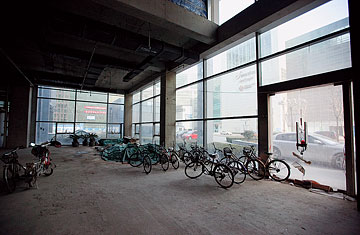
Empty promises
Beijing's vacant commercial space is a disquieting sign
As he threads his taxicab every day through the epic traffic jams in and around Shanghai, jabbering on his cell phone and muttering under his breath, Yang Jinyu seems an unlikely real estate mogul. But when the government asked him to move out of his central Shanghai home so that the land it was on could be sold for redevelopment, he took the compensation payment and bought an apartment on Shanghai's outskirts. Eight years later, after cleverly parlaying that first asset, the cabbie owns three apartments in the city and has his eyes on something bigger: a lovely five-bedroom, riverfront suburban house, owned but never occupied by a coal magnate from Shanxi province. "How much does he want for it?" he asked a local real estate agent in late February. When told the answer was $735,000, Yang didn't blink. "I'd like to make an offer."
On the back of such tales, conventional economic thinking says, dangerous speculative bubbles are built. And these days not much — aside from the possibility of a double-dip recession in the U.S. — has more economists, international investors, hedge-fund managers and bankers tearing their hair out than the deceptively simple question, Is China's property market a bubble?
The reason for their angst is clear enough: throughout 2009, the most severe global downturn in decades, China's economic growth remained intact. This year, China's GDP will likely rise 9% or more, in contrast to a merely subpar recovery in the U.S. and Europe. For thousands of companies across the globe, anything that threatens China's buoyancy threatens their own bottom lines. (Witness the sell-off in the S&P 500 on Feb. 12, when Beijing's central bank raised by a tick the so-called reserve ratio requirement for its banks.) And nothing, not even massive government infrastructure spending, has driven China's growth more than real estate investment.
Last year, total fixed-asset investment accounted for more than 90% of China's overall growth; residential and commercial real estate investment comprised nearly a quarter of that. Toss in the not insignificant fact that it was a huge real estate bust in the U.S. that dumped the world into recession in the first place, and many analysts are now beginning to fear the worst. "China's property market," says independent Shanghai economist Andy Xie, "is a massive bubble."
Since the start of the year, it has become clear that such concerns are shared by the central government in Beijing, which is seeking to tighten credit growth generally, and property loans in particular. The latest budget report from the Ministry of Finance, released to coincide with the opening of the National People's Congress in Beijing on March 5, draws attention to debt levels being incurred by local governments forging headlong into massive infrastructural and development projects. Even as it was being distributed, Premier Wen Jiabao was telling NPC delegates that the authorities would slow both lending and new construction in 2010, and place additional curbs on speculative property investment. A mortgage discount for first-time property buyers — which made a fixed, 5% 20-year mortgage available for just above 4% — has already been eliminated, and lending standards for buyers looking at second and third properties as investments have been tightened appreciably.
The moves are belated. According to data compiled by real estate consultancy Colliers International, residential prices in 70 large and medium-sized cities across China soared in 2009, with 50% to 60% increases in Beijing and Shanghai. Real estate mania has become so intense that it has spilled over into pop culture. Last year one of the most popular television shows was a weekly drama entitled Wo Ju (literally "Dwelling Narrowness"), which focused on the plight of a young couple who spend two-thirds of their monthly income keeping up the mortgage on a tiny Shanghai apartment. Their tale is all too real. As economist Xie points out, residential prices in China relative to per capita income are far and away the highest in the world. The housing price-to-income ratio in urban China is over 20, which means it takes the average citizen's total wages for 20 years to buy an average dwelling. (By comparison, the highest housing affordability ratio for a U.S. city — Honolulu — is 8.2.)
Some economists worry that oversupply in both the residential and commercial real estate markets has already prompted a downturn in pricing, and that the recent government initiatives could lead to a hard landing. In Beijing, vast swaths of commercial space sit vacant — including floors of retail space right next to the iconic Water Cube, the swimming venue for the 2008 Olympics. According to Colliers, commercial rents are now a shade lower than they were last year and residential prices have also begun to weaken. Residential prices, according to China Reality Research data, peaked late last year and are now headed down.
